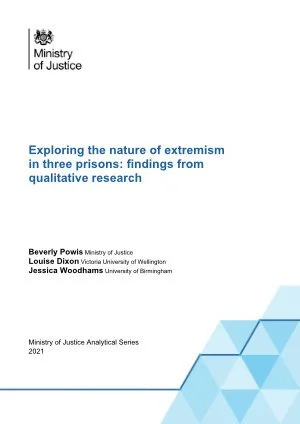By Beverly Powis, Louise Dixon and Jessica Woodhams
Study aims This exploratory qualitative study explores the extent and nature of prisoner radicalisation in three high security prisons in England, how the establishments were managing extremist prisoners and responding to the risk of radicalisation. Approach and interpreting findings Interviews were conducted, between January 2014 and January 2015, with 83 male prisoners and 73 staff from a range of disciplines, including, prison wing officers, security staff, psychologists, offender supervisors and chaplains across the three establishments. Interview material was analysed using thematic analysis. The findings should be viewed with a degree of caution as the views presented may not be representative of all prisoners or staff. Key findings While the study aimed to examine all forms of extremism, only Islamist extremism was reported by respondents, as this was considered to be the most prevalent extremist ideology in prisons at the time of the fieldwork. This study found that, despite their small number, those convicted of Islamist extremist offences had a disproportionately disruptive influence in the prisons, exerting power and influence over other prisoners. However, not all were interested in pursuing an Islamist extremism agenda. They tended to either be motivated by an extremism agenda or interested in orchestrating anti-establishment and criminal activities of what was frequently described as a ‘prison gang’. Those who were motivated by extremism were making attempts to radicalise others. While some prisoners outside of these groups were reported to express sympathies with Islamist extremism, there was little suggestion they would act upon this when released. Prisoners who were considered to be more susceptible to Islamist radicalisation were those thought to be most vulnerable within prison, who had the strongest sense of loss, loneliness, and alienation. They also tended to have grievances against society and the prison system, channelling their anger and frustration into extremism
Ministry of Justice Analytical Series 202. London: Ministry of Justice, 2021. 35p.



